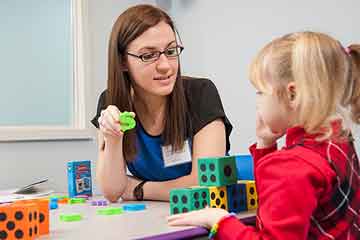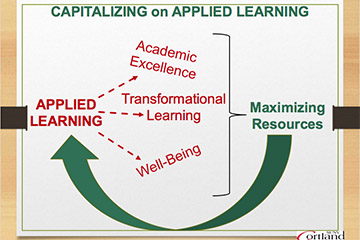
10/24/2017
Two years ago, SUNY Cortland students majoring in geographic information systems (GIS) volunteered to use what they learned in class to create a detailed map of the infrastructure running beneath the nearby Village of McGraw.
The experience enriched the students’ education in many ways, and it gave the small village a tool that will make maintenance of its water and sewer pipes more efficient and less expensive.
Applied learning — the term used by SUNY to describe internships, entrepreneurship, clinical placements and scores of other non-classroom experiences — is something that more than 80 percent of all SUNY Cortland students benefit from. It is well known that experiences such as that which the GIS students had in McGraw lead to better understanding, more community engagement and improved employment prospects.
What’s not well known is the economic impact all of this activity has on the College, the Cortland area and communities throughout the region.
“Applied learning is integral to SUNY Cortland’s mission and financial health, but we do not know the extent, nature and economic value of SUNY Cortland’s applied learning activities,” said John Suarez, who directs the College’s Institute for Civic Engagement.
So Suarez and an advisory panel of faculty, staff, students and not-for-profit agency representatives are putting the question to the public.
On Thursday, Nov. 2, Suarez and representatives from the College’s Civic Action Plan Advisory Panel will share details and answer questions from the public during a Community Roundtable. The roundtable, titled “SUNY Cortland’s ‘Civic Action Plan’,” will be held from 8 to 9 a.m. in the Park Center Hall of Fame Room.
Hosted by the President’s Office, the event is free and open to the public. Refreshments will precede the presentation at 7:45 a.m.
“We will identify and develop ways in which the College can capitalize on applied learning projects,” said Suarez, who wants input on how the economic impact of real-world educational experiences can be measured and how it can be improved.
In addition to Suarez, advisory panel presenters at the roundtable will include William Viet, risk management officer; Benjamin Wilson, assistant professor of economics; Catherine Cullen, special projects officer in the School of Education; and Alexandra Cicero, an international studies and communication studies dual major.
The advisory panel will help the institute fulfill the College’s Civic Action Plan, which aims to ensure the effectiveness and sustainability of applied learning projects. SUNY Cortland President Erik J. Bitterbaum has recently re-committed SUNY Cortland to the public value of public education and to gathering more data to ensure its sustainability, noted roundtable organizers.
“That [plan’s] purpose is to provide students with real-life challenges that demand initiative, collaboration and creativity,” Suarez said. “Applied learning projects offer such challenges. To meet that purpose and to help ensure the sustainability of such initiatives, the plan explores and builds on their direct and indirect economic returns.”
The College has earned repeated honors for the number of students conducting service learning projects and for the quality of those projects.
Among numerous other kudos, the College’s efforts have earned SUNY Cortland Carnegie Foundation for the Advancement of Teaching’s Community Engagement elective classification and a place on the President’s Higher Education Community Service Honor Roll with Distinction.
The advisory panel will assess such considerations as the extent of applied learning at SUNY Cortland, students’ applied learning course outcomes, and benefits to alumni, the greater Cortland community and indirect economic benefits to the College.
Examples of the returns on applied learning include direct benefits such as the ability to compose stronger external grant proposals. They also include indirect benefits such as recruitment and retention of faculty, staff and students, as well as economic ‘splashback’ to the College from improved quality of life in the city and county of Cortland — like the GIS mapping of McGraw.
“We would want to look at what ways the interns’ service would improve quality of life and how that improved quality of life would improve the finances of the College,” Suarez said. “We can look at ways this can happen and build on them.”
This involves measuring the obvious such as transportation costs as well as the subtle effect on the College’s bottom line if the research data show that the applied learning experiences increase a student’s chances at academic success and timely graduation.
Additional advisory panel members include Brandy Strauf, family development director for the Community Action Plan of Cortland County; Christine Widdall, college task stream coordinator; Stuart Daman, assistant for institutional research and analysis; Steve Cunningham, director for institutional research and analysis; Mark Prus, provost and vice president for academic affairs; Andrea Lachance, dean of education; Cynthia Guy, the institute’s community outreach coordinator and Laura Barnstead, a political science and professional writing dual major.
For more information about the roundtables, contact Samantha Howell, special events coordinator for the President’s Office, at 607-753-5453, or visit the Community Roundtables webpage.